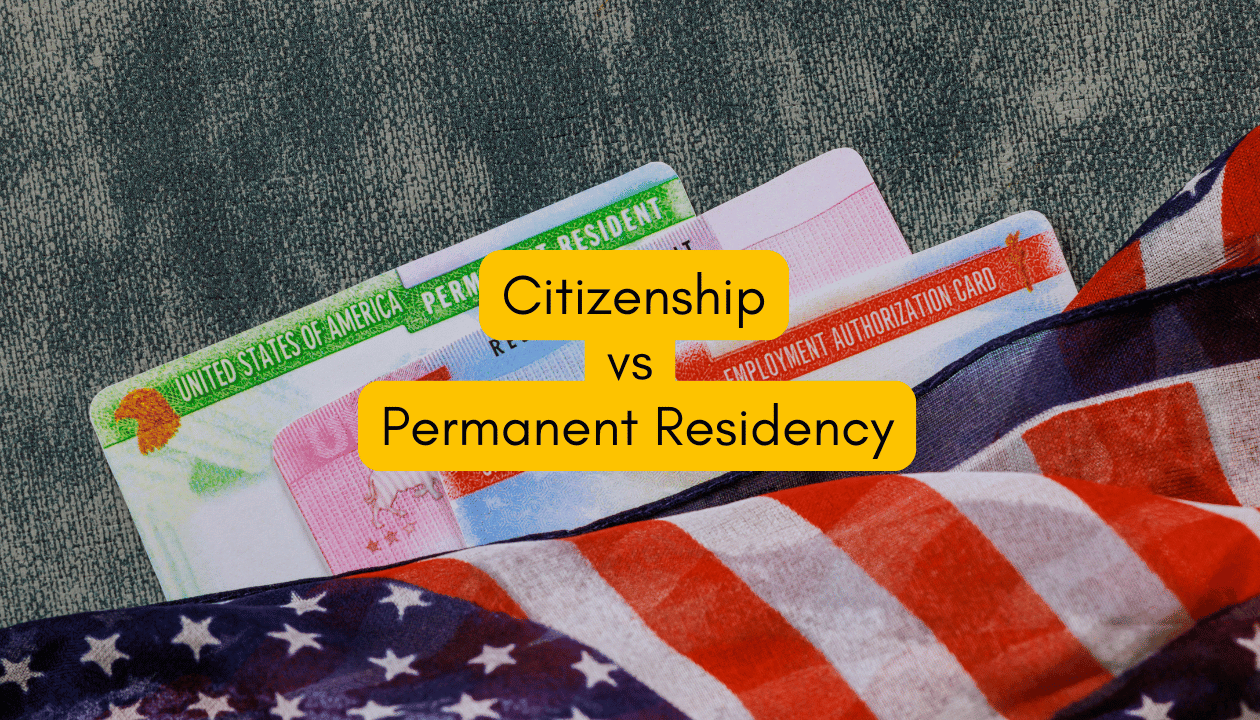With USCIS policies continuing to evolve in 2025, many people find it confusing to distinguish between U.S. citizenship and permanent residency. We understand these terms can raise a lot of questions when you’re deciding which path fits your life. You are not alone in your uncertainty. Understandably, immigration law can feel complex.
Each status offers different rights and responsibilities, and knowing these differences can help you feel more confident. This article will clearly explain the most important distinctions in simple, straightforward language.
We aim to help you feel informed and supported as you learn what each status means for you and your future. Before making any decisions, we encourage you to seek legal guidance to determine which status fits your needs best.
What Is a Lawful Permanent Resident?
A lawful permanent resident is someone who receives approval to live and work in the U.S. indefinitely. This status is also known as having a permanent resident card or Green Card. People who pursue permanent residence often do so through family, employment, or refugee status.
While permanent residents enjoy significant benefits, they are not full citizens. They cannot vote in federal elections or hold public office. They must also renew their card and meet residency requirements to keep their status. Failing to follow the rules, committing certain crimes, or spending an extended period outside the U.S. can result in losing permanent resident status.
Having permanent residence is an important step, but it’s not the final one. Many people later decide to apply for U.S. citizenship to secure long-term stability and broader rights.
What Does It Mean to Be a U.S. Citizen?
A U.S. citizen holds the highest status under American immigration law. Some people hold citizenship by birth, while others apply for U.S. citizenship through naturalization after meeting the required timeline.
Citizens enjoy unique benefits that are not available to permanent residents. They have full voting rights, can run for certain government jobs, and may sponsor more certain relatives for immigrant visas. A citizen may also pass citizenship to unmarried children born abroad, depending on the law and the child’s age at birth.
Another key benefit is international freedom. Citizens use an unexpired passport from the United States and can travel freely to many countries with visa-free travel. They never need a reentry permit, and they cannot be deported for criminal activity or other violations once naturalized.
While citizenship comes with added duties like jury duty and taxes on worldwide income, the key features of citizenship offer long-term security and opportunity.
The Process — How People Reach Each Status
A. Becoming a Permanent Resident
There are several ways to receive permanent residence in the U.S. The most common path is through sponsorship by immediate relatives, such as a U.S. citizen spouse or parent. Others qualify through a job offer or special programs tied to refugee status or humanitarian need.
People already in the U.S. may apply through an application process called adjustment of status. This allows them to stay while their case is pending. Those living outside the country complete consular processing after their petition is approved. Each path has its own eligibility criteria, forms, and waiting periods.
The vast majority of applicants must prove that they meet financial and legal standards and do not pose a threat to public safety. Working with immigration authorities can be complex, and mistakes may lead to delays or denials.
Once approved, a person becomes a lawful resident with a valid alien registration card.
B. Becoming a U.S. Citizen
To become a citizen through naturalization, most people must hold permanent resident status for five years. Those married to U.S. citizens may qualify after three years. Applicants must meet physical presence rules, show good moral character, and pass a civics test.
The process begins by filing Form N-400. Applicants attend a biometrics appointment and an interview at a USCIS district office. If approved, they take the Oath of Allegiance.
Citizenship also requires honesty. Any willful misrepresentation or false claims on the application can lead to denial. In rare cases, it may even cause a loss of status later.
Because citizenship depends on meeting several legal and personal requirements, it’s important to prepare carefully. Once granted, it brings lasting rights that no other status can offer.
Key Differences You Should Know
Here’s a quick look at how the two statuses compare:
- Right to Vote: Only U.S. citizens can vote in federal elections and most local elections.
- Deportation Risk: Lawful residents may face removal for certain crimes. Citizens do not.
- Sponsorship: Citizens may petition certain relatives not allowed under permanent residency.
- Travel Protection: Citizens do not need a reentry permit prior to traveling abroad.
- Jobs & Benefits: Citizens can apply for certain government jobs. Most employers limit sensitive roles to citizens.
- Stability: A permanent home in the U.S. is more secure with citizenship. Permanent residency can still be lost.
- Documents: Citizens travel on a U.S. passport; LPRs must carry an unexpired green card.
- Time Abroad: LPRs must limit travel. Extended trips can affect status without a reentry permit.
These important differences show why legal advice can help you choose the best path for your future.
The Risks of Staying a Green Card Holder Too Long
Remaining a permanent resident without moving toward U.S. citizenship can carry real risks. A missed renewal deadline, a mistake while traveling abroad, or involvement in criminal activity may put your permanent resident status at risk.
Some applicants delay because they feel unsure about the application process or the eligibility criteria. Others assume they’ll always be safe as long as they follow the law. But immigration law changes fast, and even certain crimes or other violations can lead to removal.
Delaying citizenship also means missing out on long-term benefits, including the right to vote, easier travel, and full protection under U.S. law.
For those who qualify, the right time to apply for U.S. citizenship often comes sooner than expected. Legal guidance helps ensure you don’t wait too long and risk losing everything you’ve worked for.
Why You Should Talk to a Trusted Immigration Attorney
Choosing between permanent residence and citizenship is more than a paperwork decision. It affects your future, your family, and your freedom. The law is complex, and the consequences of a misstep can last for years.
A qualified attorney helps you understand your residency requirements, avoid mistakes, and determine if now is the right time to move forward. They also help protect your rights if you’ve had prior immigration issues or concerns about false claims or past status gaps.
At The Chidolue Law Firm, we don’t just explain the rules — we walk with you every step of the way. Whether you’re applying for a permanent resident card, preparing to hold citizenship, or unsure which status is best, we offer clear guidance and strong support.
Know Your Options — Protect Your Future
The difference between citizenship and permanent residence can impact your rights, responsibilities, and long-term security. Each status offers different protections, and the right choice depends on your personal and legal situation.
Legal guidance helps you avoid delays, meet requirements, and choose the best path forward. At The Chidolue Law Firm, we support individuals and families who need clarity and confidence during important immigration decisions.
📞 Call The Chidolue Law Firm today at:
➡ 407-995-6567
➡ 678-325-1037
💬 For WhatsApp inquiries, contact us at:
➡ 404-333-8751
Let’s protect your future — together.
FAQs
Q1: Do I lose my green card if I stay outside the U.S. too long?
Yes. Travel over 12 months without a reentry permit may lead to loss of lawful permanent residence.
Q2: Can permanent residents vote in U.S. elections?
No. Only U.S. citizens have voting rights in federal and most local elections.
Q3: Does citizenship allow me to sponsor more relatives?
Yes. Citizens can sponsor a broader group, including unmarried children over 21 and certain relatives not allowed under green card rules.
Q4: Are there jobs only U.S. citizens can get?
Yes. Certain government jobs require citizenship. Most employers with security roles list it as a condition.



